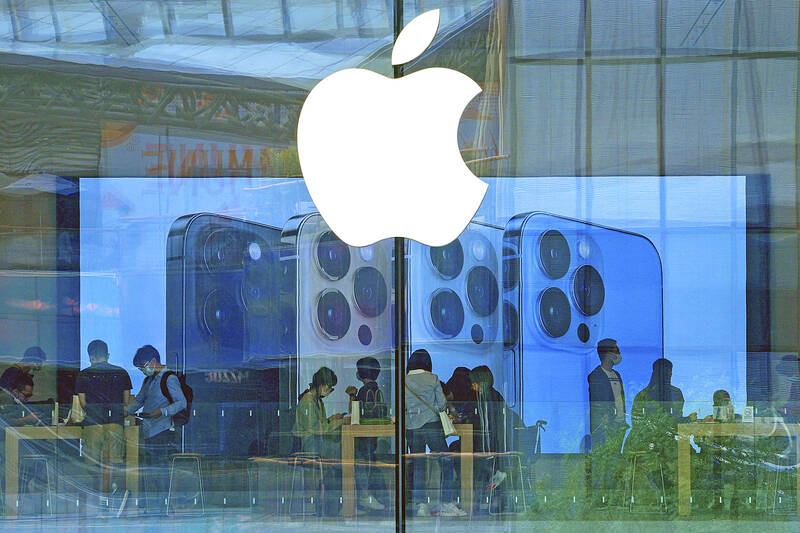Apple Inc is to deliver some of its upcoming artificial intelligence (AI) features this year via data centers equipped with its in-house processors, as part of a sweeping effort to infuse its devices with AI capabilities.
The company is placing high-end chips — similar to ones it designed for the Mac — in cloud computing servers designed to process the most advanced AI tasks coming to Apple devices, people familiar with the matter said.
Simpler AI-related features would be processed directly on iPhones, iPads and Macs, they said, asking not to be identified because the plan is still under wraps.

Photo: AP
The move is part of Apple’s much-anticipated push into generative AI — the technology behind ChatGPT and other popular tools.
The company is playing catch-up with big tech rivals in the area, but is poised to lay out an ambitious AI strategy at its Worldwide Developers Conference on June 10.
Apple’s plan to use its own chips and process AI tasks in the cloud was hatched about three years ago, but the company accelerated the timeline after the AI craze — fueled by OpenAI’s ChatGPT and Google’s Gemini — forced it to move more quickly.
The first AI server would use the M2 Ultra chip, which was launched last year as part of the Mac Pro and Mac Studio computers, though the company is already eyeing future versions based on the M4 chip.
Relatively simple AI tasks — such as providing users a summary of their missed iPhone notifications or incoming text messages — could be handled by the chips inside of Apple devices.
More complicated jobs, such as generating images or summarizing lengthy news articles and creating long-form responses in e-mails, would likely require the cloud-based approach — as would an upgraded version of Apple’s Siri voice assistant.
The move, coming as part of Apple’s iOS 18 rollout in the fall, represents a shift for the company.
For years, Apple prioritized on-device processing, touting it as a better way to ensure security and privacy.
However, the components inside the processors can already safeguard user privacy, said people involved in the creation of the Apple server, called “Project ACDC” (Apple Chips in Data Centers). Apple uses an approach called Secure Enclave that can isolate data from a security breach.
For now, Apple is planning to use its own data centers to operate the cloud features, but it would eventually rely on outside facilities — as it does with iCloud and other services.
The Wall Street Journal reported earlier on some aspects of the server plan.
Apple chief financial officer Luca Maestri hinted at the approach on an earnings call last week.
“We have our own data center capacity and then we use capacity from third parties,” Maestri said after being asked about the company’s AI infrastructure.
“It’s a model that has worked well for us historically, and we plan to continue along the same lines going forward,” he said.

In Italy’s storied gold-making hubs, jewelers are reworking their designs to trim gold content as they race to blunt the effect of record prices and appeal to shoppers watching their budgets. Gold prices hit a record high on Thursday, surging near US$5,600 an ounce, more than double a year ago as geopolitical concerns and jitters over trade pushed investors toward the safe-haven asset. The rally is putting undue pressure on small artisans as they face mounting demands from customers, including international brands, to produce cheaper items, from signature pieces to wedding rings, according to interviews with four independent jewelers in Italy’s main

Japanese Prime Minister Sanae Takaichi has talked up the benefits of a weaker yen in a campaign speech, adopting a tone at odds with her finance ministry, which has refused to rule out any options to counter excessive foreign exchange volatility. Takaichi later softened her stance, saying she did not have a preference for the yen’s direction. “People say the weak yen is bad right now, but for export industries, it’s a major opportunity,” Takaichi said on Saturday at a rally for Liberal Democratic Party candidate Daishiro Yamagiwa in Kanagawa Prefecture ahead of a snap election on Sunday. “Whether it’s selling food or

CONCERNS: Tech companies investing in AI businesses that purchase their products have raised questions among investors that they are artificially propping up demand Nvidia Corp chief executive officer Jensen Huang (黃仁勳) on Saturday said that the company would be participating in OpenAI’s latest funding round, describing it as potentially “the largest investment we’ve ever made.” “We will invest a great deal of money,” Huang told reporters while visiting Taipei. “I believe in OpenAI. The work that they do is incredible. They’re one of the most consequential companies of our time.” Huang did not say exactly how much Nvidia might contribute, but described the investment as “huge.” “Let Sam announce how much he’s going to raise — it’s for him to decide,” Huang said, referring to OpenAI

The global server market is expected to grow 12.8 percent annually this year, with artificial intelligence (AI) servers projected to account for 16.5 percent, driven by continued investment in AI infrastructure by major cloud service providers (CSPs), market researcher TrendForce Corp (集邦科技) said yesterday. Global AI server shipments this year are expected to increase 28 percent year-on-year to more than 2.7 million units, driven by sustained demand from CSPs and government sovereign cloud projects, TrendForce analyst Frank Kung (龔明德) told the Taipei Times. Demand for GPU-based AI servers, including Nvidia Corp’s GB and Vera Rubin rack systems, is expected to remain high,